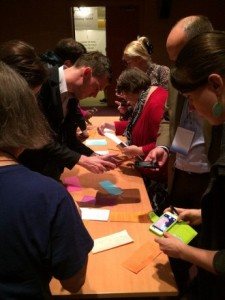
By Michael Griffin
What do Thomas Farrell, Barbara Sakamoto, Claire Kramsch, Chuck Sandy, Willy Renandya, and Jeremy Harmer have in common? Aside from being huge names in our field they are all people who were scheduled to give talks in South Korea in calendar year 2015. South Korea (hereafter Korea) is home to some big ELT conferences. I believe the KOTESOL International Conference is the biggest and best-attended of these. From my view, big conferences are just one of the reasons Korea can be a great place for professional development for English teachers. In this short “non-blog” post I’d like to explore some of the other reasons. Simply put, there is a lot of different types of professional development (PD) for English teachers happening and it is relatively nearby, accessible, and inexpensive.
Just how many PD events are happening in Korea? A quick glance at the KOTESOL Events Calendar will give you a hint of how many professional development events there are. It is also nice to see the range of events in terms of themes and structure. A glance at the non-KOTESOL Domestic Events will show even more events and opportunities. Add #KELTchat nearly twice a month and monthly KOTESOL RP-SIG meetings in three cities and it seems like there is at least something going on every week.
The next six weeks or so figure to be very busy with the MEESO International Conference on August 19th, the KOTESOL RPSIG Day of Reflection on August 22nd, the KATE International Conference on August 29th, and the KAPEE Summer Workshop on August 29th as well. The latter two are actually postponements due to the MERS scare earlier this summer but could be good chances for those looking to get a PD fix just before the start of September.
Korea is surely not alone in having a vibrant PD scene but I think there are a few things that set it apart. The relatively small size of the country coupled with Korea’s excellent transportation infrastructure make attending events easier than it might be in other countries. Events in cities seemingly quite far away are still pretty accessible. Additionally, the high smartphone and internet penetration rates make attending events like #KELTchat chats or participating in the numerous Facebook groups or discussion sites which are (at least loosely or nominally) focused on teaching even easier. It might be unrelated to Korea’s status as a wired country but I should also mention Korea is something of a hotbed for ELT blogs with those by Anne Hendler, David Harbinson, Josette LeBlanc, Tim Hampson, and Alex Grevett as just a few examples.
Korea’s “English Fever” might not always be seen as a good thing but one benefit from my perspective is how the sheer number of people involved in English education in this country guarantees there is always a wide range of teachers with various experiences and perspectives. This means there are specific organizations that cater to a variety of interests. It also means that organizations like KOTESOL will potentially offer something for everyone due to the range of interests and levels of experience and commitment being served. I mentioned accessibility above in terms of transportation but I think there is another aspect of accessibility at play here in that PD is open and available for teachers of all experience levels and ideally in all teaching contexts. A nice example of very accessible workshops are the “101” sessions at KOTESOL’s International Conference.
In the past year or so I have been lucky enough to attend ELT events in Japan, Cambodia, Thailand, and various places in Korea. I have mostly been very impressed with the value for money at events in Korea. For example, KOTESOL’s International Conference (for which “Early Bird Registration” is now happening) costs 75,000 won (around $70) for non-members (and is much cheaper for members) which is a bargain in my eyes for two full days of a conference of its size and stature. I think PD in Korea tends to be a very good deal, especially relative to teachers’ salaries. Also, some of the events and opportunities mentioned above are free, which is the best price for anything.
While it is not always perfect and might be easy to overlook or forget, I think there are great opportunities for English teachers and their professional development in South Korea. This is especially true when we consider variety, accessibility, and cost. In the title I asked if Korea is a dynamic hub of PD? It seems like the Korean government is often trying to brand “Dynamic Korea” as the hub of something or other (from finance to tech, to transportation, to green growth) but perhaps the country has become a hub of English teacher professional development.
Bio:
Michael Griffin teaches at a university in Seoul as well as online. He is one of the co-founders of The KOTESOL Reflective Practice SIG and is a former Associate Editor of “The English Connection” magazine. He first attended the KOTESOL International Conference in 2001 and has attended each IC since 2008 presenting at most of them. He blogs semi-regularly at https://eltrantsreviewsreflections.wordpress.com/ and tweets very regularly at @michaelegriffin .
Photo credit: https://www.flickr.com/photos/9921452@N08/15254679858/in/photostream/
Barbara Sakamoto


